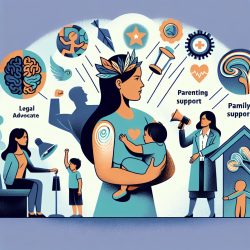In the realm of mental health and parenting, one of the most challenging issues is the high rate of child custody loss among mothers with schizophrenia. The research article "Intervention to Prevent Child Custody Loss in Mothers with Schizophrenia" by Mary V. Seeman provides valuable insights and recommendations for practitioners aiming to support these mothers effectively. This blog post explores key findings from the research and offers actionable strategies for practitioners to enhance their skills and improve outcomes for families.
The Challenge of Custody Loss
Mothers with schizophrenia face a daunting reality: approximately 50% lose custody of their children at some point. This statistic underscores the need for targeted interventions and support systems that address both the mental health needs of these mothers and the well-being of their children. The stigma associated with schizophrenia often leads to misconceptions about parenting capabilities, further complicating custody matters.
Understanding the Research Findings
The research emphasizes several critical areas where practitioners can make a difference:
- Maintaining Mental Health: Encouraging mothers to prioritize their mental health is crucial. This includes adherence to medication, regular health check-ups, and maintaining a healthy lifestyle.
- Preventing Psychotic Relapse: Practitioners should guide mothers in identifying personal relapse triggers and developing crisis plans that involve family and community support.
- Documenting Parenting Activities: Helping mothers maintain detailed records of their daily parenting activities can provide evidence of their competence in court proceedings.
- Navigating Legal Systems: Educating mothers about legal rights and connecting them with knowledgeable attorneys can significantly impact custody outcomes.
- Utilizing Parenting Resources: Directing mothers to available resources such as parenting classes, support groups, and respite services can enhance their parenting skills and confidence.
The Role of Practitioners
Practitioners play a pivotal role in bridging the gap between mental health services and child protection agencies. By fostering collaboration among these entities, practitioners can help dissolve administrative barriers that often hinder effective support for families. Additionally, advocating for wraparound services that address the comprehensive needs of both mother and child can create a more supportive environment for families impacted by schizophrenia.
Encouraging Further Research
The findings from this research highlight the importance of continuous learning and adaptation in practice. Practitioners are encouraged to delve deeper into related studies to expand their understanding of effective interventions. Engaging in ongoing professional development through conferences, publications, and webinars will equip practitioners with the latest knowledge and skills needed to support these vulnerable families.
A Call to Action
The journey towards preventing unnecessary child custody loss among mothers with schizophrenia requires dedication, empathy, and collaboration. By implementing the strategies outlined in this research, practitioners can empower mothers to retain custody of their children and foster healthier family dynamics. Together, we can work towards a future where mental illness does not automatically equate to parental incompetence.
To read the original research paper, please follow this link: Intervention to Prevent Child Custody Loss in Mothers with Schizophrenia.










